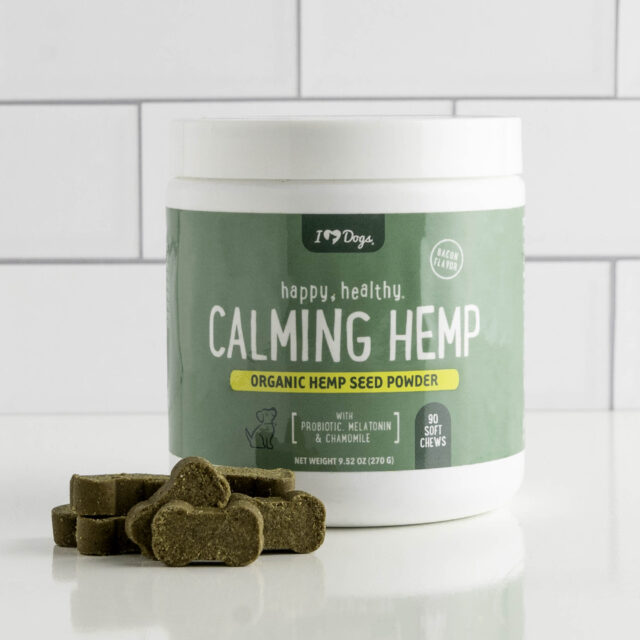When dogs are uncomfortable or in pain, they get stressed. They don’t know how to handle their health problems, and it’s hard for them to tell us what’s wrong. Luckily, ingredients like ginger root for dogs can help prevent many types of pain and discomfort, such as issues related to digestion, immune systems, and inflammation.
You shouldn’t have to watch your dog suffer and wonder what went wrong. A healthy diet with essential supplements can lower the risk of many common health problems. So, consider using this unique plant to relax your pup.

What is Ginger Root?
Ginger is a tropical plant that is native to Asia. Its roots were commonly used in Traditional Chinese Medicine and Western Herbal Medicine. Humans often use it as an herb in recipes because it has many positive effects, including controlling nausea, blood pressure, and heart disease. That’s why humans often drink ginger ale when their stomach is bothering them.
This ingredient has been used in medicine for thousands of years. It’s mentioned in ancient Sanskrit, Arabic, Greek, Roman, and Chinese texts. It was most commonly used in Asia for stomachaches, nausea, and diarrhea.
As it turns out, ginger root is also an effective ingredient for canines for many of the same reasons. It provides an overall health boost for both humans and animals.
Is Ginger Root Good for Dogs?
Yes, ginger root is a safe and healthy herb for dogs. It’s packed with antioxidants to give your dog plenty of health benefits. Yet, as with all ingredients, it should be served in moderation. Never give your dog more than the recommended dose, and always consult your vet before adding a new medication or supplement to their diet.

Can Dogs Eat Ginger in Other Forms?
Raw ginger root and ginger root supplements are the most common ways to serve ginger to dogs. However, humans eat lots of foods that contain this herb, so can dogs benefit from those too?
In most scenarios, the answer is no. Human foods containing ginger, such as gingerbread, ginger biscuits, or ginger cake, usually contain extra ingredients to enhance the flavor. Many ingredients that are tasty for humans aren’t safe for dogs. So, instead of sharing your ginger snacks with your pup, focus on giving them food items that only contain dog-safe ingredients.
Related: 12 Best Dog Breath Fresheners
What is Ginger Good For?
Ginger root benefits dogs in a wide variety of ways. Even if the supplement for ginger root is made for one specific purpose, your pup could still experience some other effects. So, here’s what to expect when serving ginger to dogs.
Reducing Nausea
Anti-nausea properties are the most common use of ginger for both humans and pets. Whether your dog is ill, stressed, or experiencing motion sickness, this ingredient can lower its risk of vomiting. Ginger contains gingerol and shogaol, which are compounds that help speed up the digestive process to calm an upset stomach. Those compounds also give ginger root its flavor.
A 2007 study compared ginger to an anti-nausea drug called dimenhydrinate. Both had similar effects on humans, but ginger had fewer side effects. It’s suspected that ginger could replace dimenhydrinate for canines too.

Promoting Healthy Digestion
Since ginger root has compounds to regulate an upset stomach, it can help with plenty of gastrointestinal problems beyond just nausea. It can help your pup avoid problems like stomach pain, flatulence, constipation, diarrhea, and bloat. As dogs get older, tummy troubles become more common, so it’s good to prevent them early on.
Ginger can stimulate movement in the stomach, reduce internal inflammation, and help the body prevent and expel gas. While many digestive issues are minor, bloat can unexpectedly kill dogs. Bloat occurs when a dog’s stomach expands due to a buildup of air, food, and fluid. Ginger can help bloat during the early stages, along with other stomach problems, because it helps move content through the stomach faster.
Anti-Inflammatory Properties
Ginger can help reduce inflammation both internally and externally. In addition to soothing the many internal areas, such as the digestive tract and immune system, it’s also great for helping with joint pain. Dogs suffering from arthritis may be able to move more freely after taking ginger root. While senior dogs are the most at risk for joint problems, pets of all ages can benefit from joint relief and other anti-inflammation properties.
Immune System Support
Immune support is another life-saving benefit for senior dogs. This herb has anti-viral, anti-toxic, and anti-fungal properties to protect dogs of all ages. It can strengthen a weakened immune system, promote blood circulation, level out low blood pressure, and dispel toxins. All of these are especially important for older dogs. Of course, a ginger root supplement alone won’t keep your senior dog healthy, but it can be a life-saver when paired with proper care.

Lowers Disease Risks
Ginger root can even help with some major health concerns, such as cancer and heartworm. Many studies have been done on humans to show how it can help fight cancer. Some results showed that it can slow breast cancer growth and kill lymphosarcoma cells. Inflammation also plays a significant role in cancer, so it makes sense that ginger’s anti-inflammatory properties would be beneficial. While not confirmed, it is suspected that ginger root can help fight cancer in canines too.
Soothes Stress
Finally, this herb may also reduce stress and anxiety in dogs. It can increase serotonin levels to calm your pup and boost their mood. Also, by helping soothe pain and discomfort in your dog’s body, they will no longer have to stress about their body hurting. It’s great for calming dogs and reducing anxiety before a long car ride.
Related: The 10 Best Calming Supplements for Dogs
Ginger Root Dosage for Dogs
Ginger comes in a wide variety of forms for dogs, including pills, chews, powders, tinctures, and raw roots. Most dog parents choose a supplement that has ginger root in it. If that’s the case, you can serve them the recommended dosage listed on the container. 1/2 to 3 chews per serving is usually recommended, based on your dog’s weight.
If you want to give your dog raw ginger root, here are the recommended doses:
- Under 10 pounds – 1/4 teaspoon
- 11 to 49 pounds – 1/2 teaspoon
- Over 50 pounds – 3/4 teaspoon

Most dog parents give their dog a dose up to three times daily or as directed on the product label. If you’re serving raw ginger, never give your dog more than a 3/4 teaspoon at a time.
If you’re ever unsure about the proper dosing of a product, consult your vet. They can suggest a specific dosage based on your dog’s age, weight, and medical needs.
Ginger Root Side Effects for Dogs
There aren’t many studies done about the side effects of ginger, but it may thin the blood. So, you should avoid serving it if your dog is also taking a blood-thinning medication. It should also be avoided if your dog is pregnant or about to go through surgery.
Some uncommon side effects of ginger include stomach pain, heartburn, diarrhea, and flatulence. If your dog has a ginger allergy, it may experience itchiness, skin inflammation, or hives.
You should always contact your vet if you notice any unusual symptoms after giving ginger to dogs. While side effects are rare, this herb works differently for every pet.
Are There Any Drug Interactions?
If your dog takes any anti-coagulants or non-steroidal anti-inflammatory drugs (NSAIDs), you should be cautious. Talk to your vet about what medications and supplements your dog is currently taking before giving them a new supplement. Your vet can help you confirm whether or not ginger root is safe for your pup’s specific situation.
What Happens if You Miss a Dose?
If you forget to give your dog a dose of ginger, it’s not the end of the world. Give your dog the dose as soon as you remember, as long as it’s not too close to their next dose. If you remember close to the time of their next dose, skip the dose you missed and wait until the next scheduled one to give them more. Your dog may not reap as many benefits that day, but at least they won’t have an increased risk of side effects.

How to Serve Ginger Root to Dogs
There are many ways to serve ginger to dogs, but some are more convenient than others. If you don’t want any other ingredients involved, you can mince organic ginger root and serve it with your dog’s food. If you’re hoping to improve your dog’s digestive system with ginger, that’s a great way to do it.
However, many pet parents find it easier to choose a supplement that contains ginger root as an ingredient. Canine supplements are made with a specific purpose in mind. So, whether you need ginger root for nausea, immune support, or stress, there’s a product for all areas of your dog’s health. Choose the one that best fits your dog’s needs.
Ginger root supplements can come in many forms, including pills, chews, powders, and liquids. Powders and liquids are easy to mix with your dog’s food, but picky pups may be reluctant to eat them. If you choose a pill, you can hide it in a treat or pill pocket to make it more appealing. Yet, if you find supplement chews, they often look and smell like treats, so you might not need to hide them at all.
Once you decide what type of supplement you’re looking for, it’s good to find a product from a company you trust. Look closely at the ingredient list before purchasing. That way, you can ensure that it only includes items you feel comfortable giving your furry friend. When in doubt, ask a vet or pet nutritionist about the product.
Calming Ginger Chews
Anxiety relief is one of the many benefits of ginger root. Ginger is especially calming when paired with other similar ingredients. The iHeartDogs Calming Chews for Dogs are tasty supplements that include ginger root along with many other stress-relieving items. These chews are meant to ease anxiety, improve digestion, and promote better sleep.
Ginger root is just one of the many beneficial ingredients that help relax your pooch. These chews also include organic hemp powder, chamomile, valerian root, melatonin, and L tryptophan. All these ingredients work together to keep your dog in tiptop shape. Plus, every container purchased donates 14 healthy meals to shelter dogs. So, you’ll be helping dogs in need while also keeping your furry friend content.
Thinking about your dog experiencing discomfort is unbearable. Whether it’s anxiety, tummy troubles, inflammation control, or immune support, ginger root may be able to help. Consider giving your pup a ginger root supplement to potentially improve their life!
- Best Joint Supplement for Dogs
- Best CBD Gummies for Dogs
- Goat's Milk for Dogs
- Skin & Coat Supplements for Dogs
- Weight Gain Supplements for Dogs
- Muscle Building Supplements for Dogs
- Heart Supplements for Dogs
- Multivitamins for Dogs
- Pill Pockets for Dogs
- Digestive Enzymes for Dogs
- Turmeric for Dogs
- Liver Supplements for Dogs
- Tear Stain Supplement for Dogs
- Breath Fresheners for Dogs
- Kidney, Urinary, & Bladder Supplements for Dogs
- Stool Eating Deterrent for Dogs
- Eye Supplements for Dogs
- Melatonin for Dogs
- Apple Cider Vinegar for Dogs
- Green Lipped Mussels for Dogs
- L Theanine for Dogs
- Chondroitin Supplements for Dogs
- MSM for Dogs
- Valerian Root for Dogs
- Chamomile for Dogs
- Boswellia for Dogs
- L Tryptophan for Dogs
- Yucca for Dogs
- Licorice Root for Dogs
- Bromelain for Dogs
- Papain for Dogs
- Devil's Claw for Dogs
- Quercetin for Dogs
- Hemp gummy for dogs
- Best Hemp Dog Treats
- Best Hemp Oil for Dogs
- Best Calming Treats, Chews, & Supplements for Dogs
- Best Bone Broth for Dogs
- Best Fish Oil for Dogs
- Best Probiotics for Dogs
- Best Hip Dysplasia Supplements for Dogs
- Best Colostrum for Dogs
- Best Quercetin for Dogs
- Best Greens for Dogs Supplements
- Best Vitamin C Supplements for Dogs
- Best Probiotic for Dog with Allergies
- Best Taurine Supplements for Dogs
- Best Dog Food Toppers
- Best Anal Gland Supplement for Dogs
- Best Dog Probiotic Powder
- Best CoQ10 Supplement for Dogs
- Best Liquid Glucosamine for Dogs
- Best Wrinkle Creams, Balms, and Wipes for Dogs
- Best Puppy Calming Treats
- Best Colloidal Silver for Dogs
- Best Adaptogen Supplements for Dogs
- Best Cognitive Supplements for Dogs
- Best Bee Pollen for Dogs
- Best Vitamin A Supplements for Dogs
- Best Vitamin E Supplements for
- Best Liquid Glucosamine Supplements for Dogs
- Best SAM-e Supplements for Dogs
- Best Hyaluronic Acid Supplements for Dogs
- Best Apple Cider Vinegar Supplements for Dogs
- Best Diarrhea Medicine for Dogs
- Best Milk Thistle for Dogs
- Best Turkey Tail Mushroom Supplements for Dogs
- Best Astaxanthin Supplements for Dogs
- Best Lutein Supplements for Dogs
- Best Electrolyte Supplements for Dogs
- Best Coconut Oil for Dogs
- Best Prenatal Vitamins for Dogs
- Best Puppy Milk Replacements
- Best Iron Supplements for Dogs
- Best Dewormer Products for Dogs
- Best Mange Medications for Dogs
- Best Cough Relief Products for Dogs
- Best Sinus Relief Products for Dogs
- Best Collapsed Trachea Supplements for Dogs
- Best Fireworks Anxiety Relief Products for Dogs
- Best Thunderstorm Anxiety Relief Products for Dogs
- Best Travel Anxiety Relief Product for Dogs
- Best Supplements for a Dog with a Torn ACL
- Best Supplements for a Dog with Patellar Luxation
- Best Supplements for a Dog with Intervertebral Disc Disease
- Best Zinc Supplements for Dogs
- Best Biotin Supplements for Dogs
- Best Tart Cherry Supplements for Dogs
- Best Resveratrol Supplements for Dogs
- Best Ginkgo Biloba Supplements for Dogs
- Best Ashwagandha Supplements for Dogs
- Best Supplements for Dogs with Cushing's Disease
- Best Adrenal Supplements for Dogs
- Best NAD+ Supplements for Dogs
- Best NMN Supplements for Dogs
- Best Supplements for Dogs with Dementia
- Best Supplements for Dogs with CCD(Canine Cognitive Dysfunction)
- Best Fiber Supplements for Dogs
- Best Spirulina for Dogs
- Best Hairball Remedies for Dogs
- Best Eye Drops for Dogs with Allergies
- Best Magnesium Supplements for Dogs
- Best Brushes for Double-Coated Dogs
- Best Dandelion Root Supplements for Dogs
- Best Probiotic for Dogs with Yeast Infections
- Best Flaxseed Oil for Dogs
- Best Chamomile Supplements for Dogs
- Best Lavender Supplements. Treats & Sprays for Dogs
- Best Collagen Supplements for Dogs
- Best Kelp Supplements for Dogs
- Best Activated Charcoal for Dogs
- Best Slippery Elm Supplements for Dogs
- Best Supplements for Dogs with Seizures & Epilepsy
- Best Antioxidant Supplements for Dogs
- Best Ubiquinol Supplements for Dogs
- Best Hormone & Glandular Supplements for Dogs
- Best Thyroid Supplements for Dogs
- Best Iodine Supplements for Dogs
- Best Dog Shedding Supplements for Dogs
- Best Detox Supplements for Dogs
- Best Postbiotics for Dogs
- Best Aspirin Products for Dogs
- Best Dog Anti-Nausea Products
- Best Dog Mouthwashes
- Best Camelina Oils for Dogs
- Best Hemp Seed Oils for Dogs
- Best Natural Anti-Inflammatories for Dogs
- Best Cancer Supplements for Dogs
- Best Sardine & Anchovy Oils for Dogs
- Best Fatty Acid Supplements for Dogs
- Best Chia Seed Supplements & Treats for Dogs
- Best Olive Oils for Dogs
- Best Amino Acid Supplements for Dogs
- Best Moringa Supplements for Dogs
- Best Echinacea Supplements for Dogs
- Best Cranberry Supplements for Dogs
- Best D-Mannose Supplements for Dogs
- Best Nettle Leaf Supplements for Dogs
- Best Marshmallow Root Supplements for Dogs
- Best Astragalus Supplements for Dogs
- Best Pumpkin Seed Supplement for Dogs
- Best Supplements for a Dog Wetting The Bed
- Best Blueberry Supplement for Dogs
- Best Bromelain Supplements for Dogs
- Best Yucca Supplements for Dogs
- Best Ginger Supplements for Dogs
- Best Rosehip Supplements for Dogs
- Best Allergy Medicines for Dogs
- Best Reishi Mushroom Supplement for Dogs
- Best Maitake Mushroom Supplement for Dogs
- Best Chaga Mushroom Supplement for Dogs
- Best Shiitake Mushroom Supplement for Dogs
- Best Cordyceps Mushroom Supplement for Dogs
- Best Lion's Maine Supplement for Dogs
- Have question? - Ask in our Dog Health Forum

 Toledo, United States.
Toledo, United States.
